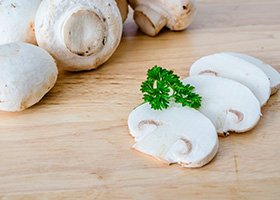
All iLive content is medically reviewed or fact checked to ensure as much factual accuracy as possible.
We have strict sourcing guidelines and only link to reputable media sites, academic research institutions and, whenever possible, medically peer reviewed studies. Note that the numbers in parentheses ([1], [2], etc.) are clickable links to these studies.
If you feel that any of our content is inaccurate, out-of-date, or otherwise questionable, please select it and press Ctrl + Enter.
Mushrooms are especially good for diabetics
Medical expert of the article
Last reviewed: 02.07.2025
 ">
">Well-known champignon mushrooms have a special effect on the microflora in the intestines, which inhibits the synthesis of glucose in the liver.
The blood glucose level is not a constant value, but it is very important for the normal functioning of the body. If this level is insufficient, then the processes of starvation of tissues and organs are triggered. Excessive amounts of glucose upset the biochemical balance in the body, change the course of metabolic processes, and lead to the development of diabetes.
Maintaining adequate blood sugar levels is possible with the help of insulin, a hormone produced by the pancreas. Insulin activates cells, forcing them to consume glucose. The development of diabetes begins precisely at the moment when there is insufficient insulin production, or when cells lose sensitivity to it. There is another side of physiology: glucose levels are no less dependent on enzyme activity, due to which synthesis processes occur in the liver and intestines.
Scientists have long been interested in factors that influence sugar levels in body tissues. Most of this content depends on our diet: some products "knock down" the glucose balance, while others normalize it. Scientists from the University of Pennsylvania (Philadelphia) claim that champignons can normalize glucose levels.
Scientists report that mushrooms can act as prebiotics, influencing the functionality of intestinal microorganisms. According to experts, the quality of intestinal microflora is of great importance in the course of metabolic processes, including sugar metabolism. Any food consumed by a person affects the body through bacteria, which first absorb certain substances themselves, and only then produce molecules that affect various biochemical mechanisms.
Professor Margherita T. Cantorna and other scientists conducted an experiment on rodents, which were divided into two groups: with normal high-quality microflora and with a deficiency of beneficial bacteria. All rodents were given food that included champignons, and separately food without mushrooms. The daily amount of mushrooms consumed by the mice was the same as if you and I consumed 90 g every day.
According to the researchers, champignons had an effect on microorganisms belonging to the genus Prevotella: the bacteria stimulated the production of short fatty acids, including butyric and succinic acids. These compounds affect the genes that stabilize glucose neogenesis – the intrahepatic production of glucose. Under the influence of mushrooms, the rate of this production decreased, and the cells of mouse organisms began to absorb glucose more actively. In rodents with poor microflora and the absence of Prevotella bacteria, such processes were not observed: thus, the scientists concluded that champignons are able to normalize glucose levels only by influencing bacteria.
Unfortunately, scientists did not specify in what form the rodents consumed the mushrooms: raw or cooked.
Read the full text of the message at https://www.sciencedirect.com/science/article/pii/S1756464618301476?via%3Dihub


 [
[